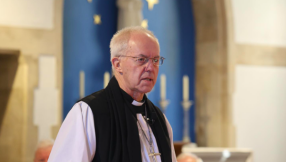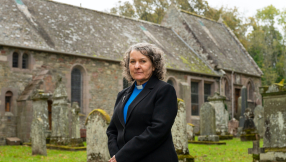
"What makes Christianity distinctive today?"
So asks Bible scholar and teacher Scot McKnight in a blog post last week, in which he refers to a recent book by the New Testament scholar Larry Hurtado: Destroyer of the gods,where Hurtado assesses the growth of Christianity in the first few centuries of the early Church.
Christianity experienced vast growth, with its numbers going from 7-10,000 in 100AD to 5-6 million by 300AD. But alongside that growth early Christians faced great opposition. Such opposition is seen in the apostle Paul's earlier life as 'Saul' the persecutor of Christians. McKnight quotes Hurtado:
"Personally, I think that Paul's zealous ire was probably provoked at least in part by what he regarded as inappropriate reverence for Jesus. Perhaps this involved both the claims made about Jesus by Jewish believers and also their devotional practices in which the risen Jesus figured prominently."
Hurtado draw on critiques of the early Church from writers like Tacitus, Pliny, Marcus Aurelius, Lucian and Celsus. McKnight summarises the critiques, asking "Do you see any analogies as you read what follows?"
For example "One finds accusations that Christians were an extravagant superstition, that Christian conversions led to economic downturns, laws were implemented against Christianity and Christians...the big image is that Christians denied the Greek and Roman gods and were therefore threatening political and social and religious stability."
McKnight adds that "laws were implemented against Christianity and Christians" and that some scholars "found disapproval in the intellectual level of Christians and in the incredible beliefs of this new religion."
Christians today sometimes think about attacks on religion coming from 'godless secularism' or 'post-enlightenment thinking' but this brief survey of the Church in its early life show that it has always been under attack, and often for similar reasons and in similar ways to what we're familiar with today.
Seen in this light, the attacks of the 'New Atheism' (of Richard Dawkins et al.) aren't that 'new' at all. Christianity doesn't just confound modern and post-modern sensibilities, but ancient ones too. One encouragement is that despite the intellectual accusations of incredibility that the Church faced, McKnight notes how the Church's own intellectuals and apologists such as Origen and Justin Martyr were offering responses that explained Christianity to a pagan world. It's a helpful reminder that even if the Church is under attack, that isn't an excuse to indulge in anti-intellectualism or avoid positive dialogue with the society of which we're a part. People always fear what they don't understand, and so a lot of the antagonism that the Church faced and faces may simply stem from the fact that people don't yet understand it.
The Church was known for devotion to a crucified Messiah, and denial of the 'gods' of the day, which is actually quite encouraging. Is that what the Church is known for today, or do we minimize our devotion, and practically worship the contemporary idols of money, sex and power? One pastor once described the early churches radical attitude to wealth and giving as "Get poor or die trying", though it's safe to say that Christians today are rather more comfortable with the accumulation of material goods.
This is of course a brief glance at the early Church, but it's always helpful to look back and ask questions of what what the Church was and what it's become. Some challenges remain, while other new ones have certainly emerged. We can't go back in time, but its good to ask ourselves:
What makes Christianity distinctive today?













